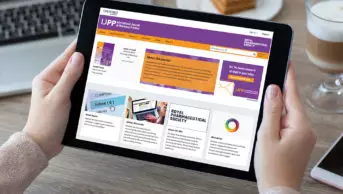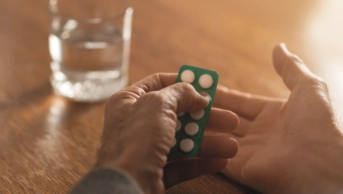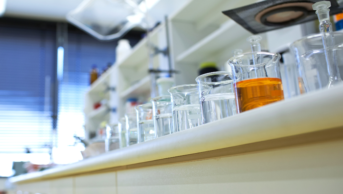
Shutterstock.com / istockphoto.com
Although many community pharmacists will be familiar with completing audits, this may be the extent of their involvement in research. However, undertaking research in a more formal way can help ensure new services are evidence based and improve public health. Additionally, being involved in research can provide a boost to a pharmacist’s career.
“If you are willing to give up a bit of your time, pharmacy research will open up a whole new world,” enthuses Jonathan Burton, head of professional standards at Right Medicine Pharmacy, an independent chain of pharmacies in Scotland.
Burton recently completed a research project on the potential roles for community pharmacists in helping those suffering from juvenile idiopathic arthritis. Being part of a research project had many professional benefits, he says. “It widened my network and my professional connections outside the community pharmacy world and there were a lot of things I took back to practice.”
Moreover, Burton was also able to explain about the role of community pharmacy to other participants. The project poster was exhibited at the British Society for Paediatric and Adolescent Rheumatology earlier this year in Belfast, where Burton also gave a talk about community pharmacy.
The project, which was in collaboration with independent pharmacy researcher Nicola Gray, was funded by Pharmacy Research UK, hosted by the Royal Pharmaceutical Society (RPS). “I didn’t need to be a researcher, have expertise in methodology or data crunching, there were other people involved who did that part,” he explains.
Getting started
As a starting point, Burton suggests: “There’s a blurry line between audit and research. Well-structured audit is research, so it’s best to start there because you’re not constrained by a formal research project.”
Rod Tucker is a researcher and community pharmacist from Yorkshire who got involved in research when he had an idea for a study. A colleague put him in touch with a Cambridge academic and they worked the idea into a proposal and applied to Pharmacy Research UK, which agreed to fund it.
Tucker’s first study was a questionnaire enquiring about the range of skin conditions pharmacists encountered. It evaluated their confidence in dealing with such requests and asked about how they saw the role of pharmacists in managing skin problems.
Another way to get involved in research is through the RPS Research Ready initiative, an online self-accreditation tool covering the basic requirements for undertaking primary care research. “Our Research Ready community pharmacy programme allows community pharmacist leads to build confidence and competence in research delivery and promotes compliance with national standards,” Rachel Joynes, head of research and evaluation at the RPS, explains.
“The programme ensures patients can have confidence in their pharmacy and that the pharmacy team members themselves are confident in their abilities and fully supported to facilitate and deliver research. Through Research Ready we hope to support and empower community pharmacy to achieve excellence in research for the benefit of patients and the public.”
Once accredited, the community pharmacy details are shared with the research networks of the National Institute for Health Research (NIHR). The RPS’s Research Ready team advises research councils, medical research charities and universities about interested pharmacy sites. The pharmacy will then receive invitations to take part in studies.
Research Ready
Gareth Smith, pharmacy manager at Alphington Pharmacy in Devon, has been involved in two pieces of research. “When I was approached by our local research lead to be part of this first wave of Research Ready pharmacies I jumped at the chance,” he explains. “We had initial funding to get ourselves research ready with the RPS, which included a day for good clinical practice training with other local pharmacists.” The first study was around pharmacists’ ability to recognise, diagnose and make treatment recommendations for two dermatology conditions: acne and dermatitis. The second involved recruiting patients with existing psoriasis to gauge their understanding of their condition and how best to treat it.
Both pieces of research were carried out in conjunction with Robert Gordon University in Aberdeen. For the first study, all the recordings and photos were uploaded electronically to a secure portal for immediate analysis. For the psoriasis study, data were collected on paper and these were returned to the university for analysis (along with data from other study members) in order to get a broad picture across the country.
After this first initiative, Rory Thompson, a pharmacist at Lloydspharmacy in Chudleigh, Devon, was approached by a community pharmacy research champion to get Research Ready. Because he could not attend the training day, he completed an online course run by the NIHR and undertook an assessment. Using a grant of £500 from Royal Devon and Exeter Foundation Trust, Thompson participated in the same two studies as Smith.
Advice for researchers
“The key to the success of the research has been making use of the skills of the whole team,” Smith elaborates. “Make sure you have a strong team behind you, you can’t do it on your own. Make sure you have the right skill mix because you will need to free your time for the consultations and sometimes they will take longer than you think.”
He adds that good planning, organisation and up-to-date consultation skills are essential. In addition, you need to consider what knowledge you already have in the area of research and how to plug any gaps. “Don’t start until you feel confident in the topic,” he advises.
Smith benefitted from the research in a number of ways: “I found research an excellent way to develop new clinical skills to benefit patients, as well as improve the understanding of how pharmacy can contribute in new ways to the primary healthcare team,” he explains.
Thompson also emphasises the importance of his pharmacy team. “I have a fantastic team who helped me recruit by identifying patients as they browsed in the pharmacy or accessed other pharmacy services,” he explains. “I have learned more about the research process and it has sparked my interest in dermatology, I feel more confident in providing evidence-based advice to our dermatology patients. Not only has this really helped patients, but it has also given me a sense of clinical job satisfaction.”
Barriers to research
Tucker already had some experience of research because he has completed a PhD, and explains that the techniques are “broadly similar”. However, he admits that because pharmacists are not normally trained in the research process, they are not familiar with inviting patients to participate in research and all that it entails. “In my experience, pharmacists always feel that the research is a good idea, but get bogged down with the day job and don’t always have the time to engage with suitable patients for studies and thus miss an opportunity.”
Tucker acknowledges that research is “tough and takes a lot of time and effort” but says that community pharmacists should try to get involved. It’s best to link in with an academic pharmacy department because there are a lot of steps to take.
“There is lots to think about: design, analysis, costs, suitable funding sources. If you can get the proposal accepted and funded, you then often have to get ethical approval and that is another time-consuming process. You then need to recruit enough sites and patients. And if that is not enough, once you finally get all the data, you have to analyse the data and write up the results,” he says.
For Smith, recruiting patients to the study was particularly time consuming, despite him putting in a lot of effort. “The main barrier was the lack of patient expectation for pharmacy to be carrying out research,” he explains. “As research in community pharmacy is in its infancy, patients just don’t expect to be asked to take part in research in this setting.” The other significant barrier in pharmacy was time, so appointments were made for consultations when the staffing level made it possible.
What next?
So what happens to the completed research? “It’s best to get the results accepted in a conference, either as a poster or oral presentation,” says Tucker. “I prefer to speak about the research and then write up the presentation as a paper for publication,” he explains.
He believes that, ultimately, community pharmacy research “gives pharmacists the opportunity to improve the delivery of care to patients”. He is currently involved in four studies and is in the process of trying to get funding for two further studies.
Thompson has been asked to recruit more patients for the acne and dermatitis study in 2016 and he is hoping more research projects will follow. In fact, he is now interested in becoming a community pharmacy research lead, and is considering studying for an MSc. “Get involved, it’s something different and more interesting from the day job of clinical and accuracy checking,” he enthuses. “Building a research base in community pharmacy is such an excellent idea for the profession as our door is always open, and we see patients more than most other health professionals.”
Joynes, too, encourages community pharmacists to get involved. She believes there are a host of benefits for pharmacists, including expanding their skillsets and working with other healthcare professionals and academics, and she mentions that research and evaluation may provide evidence for local commissioning of pharmacy services.
“All pharmacists have the skills required to be involved with research if they wish, they just need support on their journey. Research does take time and effort but it can be incredibly rewarding and can change practice,” she says.


